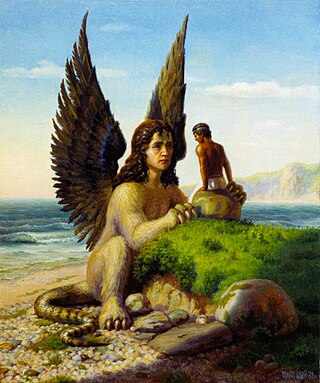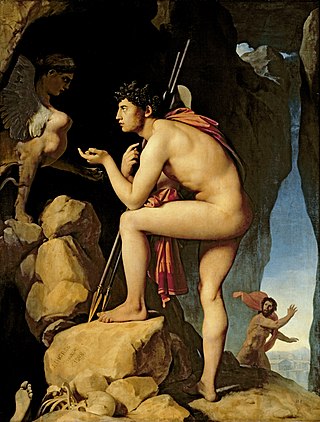Related Research Articles
Film theory is a set of scholarly approaches within the academic discipline of film or cinema studies that began in the 1920s by questioning the formal essential attributes of motion pictures; and that now provides conceptual frameworks for understanding film's relationship to reality, the other arts, individual viewers, and society at large. Film theory is not to be confused with general film criticism, or film history, though these three disciplines interrelate.

Jacques Marie Émile Lacan was a French psychoanalyst and psychiatrist. Described as "the most controversial psycho-analyst since Freud", Lacan gave yearly seminars in Paris, from 1953 to 1981, and published papers that were later collected in the book Écrits. Transcriptions of his seminars, given between 1954 and 1976, were also published. His work made a significant impact on continental philosophy and cultural theory in areas such as post-structuralism, critical theory, feminist theory and film theory, as well as on the practice of psychoanalysis itself.
Psychoanalytic literary criticism is literary criticism or literary theory that, in method, concept, or form, is influenced by the tradition of psychoanalysis begun by Sigmund Freud.
Gender studies is an interdisciplinary academic field devoted to analysing gender identity and gendered representation. Gender studies originated in the field of women's studies, concerning women, feminism, gender, and politics. The field now overlaps with queer studies and men's studies. Its rise to prominence, especially in Western universities after 1990, coincided with the rise of deconstruction.
Psychoanalytic film theory is a school of academic thought that evokes the concepts of psychoanalysts Sigmund Freud and Jacques Lacan. The theory is closely tied to Critical theory, Marxist film theory, and Apparatus theory. The theory is separated into two waves. The first wave occurred in the 1960s and 70s. The second wave became popular in the 1980s and 90s.
The matheme is a concept introduced in the work of the 20th century French psychoanalyst Jacques Lacan. The term matheme "occurred for the first time in the lecture Lacan delivered on November 4th, 1971 [...] Between 1972 and 1973 he gave several definitions of it, passing from the use of the singular to the use of the plural and back again".
Jouissance is a French language term held untranslatable into English.
Identification refers to the automatic, subconscious psychological process in which an individual becomes like or closely associates themselves with another person by adopting one or more of the others' perceived personality traits, physical attributes, or some other aspect of their identity. The concept of identification was founded by psychoanalyst Sigmund Freud in the 1920’s, and has since been expanded on and applied in psychology, social studies, media studies, and literary and film criticism. In literature, identification most often refers to the audience identifying with a fictional character, however it can also be employed as a narrative device whereby one character identifies with another character within the text itself.
In continental philosophy, the Real refers to the demarcation of reality that is correlated with subjectivity and intentionality. In Lacanianism, it is an "impossible" category because of its opposition to expression and inconceivability. The Real Order is a topological ring (lalangue) and ex-sists as an infinite homonym.
[T]he real in itself is meaningless: it has no truth for human existence. In Lacan's terms, it is speech that "introduces the dimension of truth into the real."
The Symbolic is the order in the unconscious that gives rise to subjectivity and bridges intersubjectivity between two subjects; an example is Jacques Lacan's idea of desire as the desire of the Other, maintained by the Symbolic's subjectification of the Other into speech. In the later psychoanalytic theory of Lacan, it is linked by the sinthome to the Imaginary and the Real.
Sinthome is a concept introduced by Jacques Lacan in his seminar Le sinthome (1975–76). It redefines the psychoanalytic symptom in terms of the role of the subject outside of analysis, where enjoyment is made possible through creative identification with the symptom.

The Four Fundamental Concepts of Psychoanalysis is the 1978 English-language translation of a seminar held by Jacques Lacan. The original was published in Paris by Le Seuil in 1973. The Seminar was held at the École Normale Supérieure in Paris between January and June 1964 and is the eleventh in the series of The Seminar of Jacques Lacan. The text was published by Jacques-Alain Miller.

Feminists have long struggled with Sigmund Freud's classical model of gender and identity development, which centers on the Oedipus complex. Freud's model, which became integral to orthodox psychoanalysis, suggests that because women lack the visible genitals of the male, they feel they are "missing" the most central characteristic necessary for gaining narcissistic value—therefore developing feelings of gender inequality and penis envy. In his late theory on the feminine, Freud recognized the early and long lasting libidinal attachment of the daughter to the mother during the pre-oedipal stages. Feminist psychoanalysts have confronted these ideas and reached different conclusions. Some generally agree with Freud's major outlines, modifying it through observations of the pre-Oedipal phase. Others reformulate Freud's theories more completely.
In psychoanalysis, foreclosure is a specific psychical cause for psychosis, according to French psychoanalyst Jacques Lacan.

In classical psychoanalytic theory, the Oedipus complex refers to a son's sexual attitude towards his mother and concomitant hostility toward his father, first formed during the phallic stage of psychosexual development. A daughter's attitude of desire for her father and hostility toward her mother is referred to as the feminine Oedipus complex. The general concept was considered by Sigmund Freud in The Interpretation of Dreams (1899), although the term itself was introduced in his paper A Special Type of Choice of Object made by Men (1910).
Psychoanalytic sociology is the research field that analyzes society using the same methods that psychoanalysis applies to analyze an individual.
Poststructural feminism is a branch of feminism that engages with insights from post-structuralist thought. Poststructural feminism emphasizes "the contingent and discursive nature of all identities", and in particular the social construction of gendered subjectivities.
Lacanianism or Lacanian psychoanalysis is a theoretical system that explains the mind, behaviour, and culture through a structuralist and post-structuralist extension of classical psychoanalysis, initiated by the work of Jacques Lacan from the 1950s to the 1980s. Lacanian perspectives contend that the human mind is structured by the world of language, known as the Symbolic. They stress the importance of desire, which is conceived of as perpetual and impossible to satisfy. Contemporary Lacanianism is characterised by a broad range of thought and extensive debate among Lacanians.

Sergio Benvenuto is an Italian psychoanalyst, philosopher and author. He is researcher for the Institute of Cognitive Sciences and Technologies (ISTC) of the Italian National Research Council (CNR) in Rome. He is Professor Emeritus in Psychoanalysis at the International Institute of Depth Psychology in Kiev. He founded and edited the European Journal of Psychoanalysis.
Bruce Fink is an American Lacanian psychoanalyst and a major translator of Jacques Lacan. He is the author of numerous books on Lacan and Lacanian psychoanalysis, prominent among which are Lacan to the Letter: Reading Écrits Closely, The Lacanian Subject: Between Language and Jouissance (1995), Lacan on Love: An Exploration of Lacan's Seminar VIII and A Clinical Introduction to Lacanian Psychoanalysis: Theory and Technique.
References
- ↑ "IMS Faculty - Core IMS Faculty". Pitzer College, IMS (Intercollegiate Media Studies) Department. Retrieved May 30, 2021.
- ↑ "Jennifer Friedlander". Pomona College. June 2015. Retrieved April 7, 2021.
- ↑ "Meet Jennifer Friedlander". Sigmund Freud Museum. 2021. Retrieved June 3, 2021.
- ↑ "Jennifer Friedlander". Fulbright Scholar Program. Retrieved May 30, 2021.
- ↑ "Fulbright-Freud Visiting Lecturer of Psychoanalysis". Sigmund Freud Museum. Retrieved May 30, 2021.
- ↑ Friedlander, Jennifer (2017). Real Deceptions: The Contemporary Reinvention of Realism (abstract). Oxford University Press. doi:10.1093/acprof:oso/9780190676124.001.0001. ISBN 978-0-19-067616-2 . Retrieved May 30, 2021.
- ↑ Neroni, Hilary (November 20, 2010). "Feminine Look: Sexuation, Spectatorship, Subversion (review)". Quarterly Review of Film and Video. 28 (1): 91–93. doi:10.1080/10509200802441007. S2CID 191258140 . Retrieved May 30, 2021.